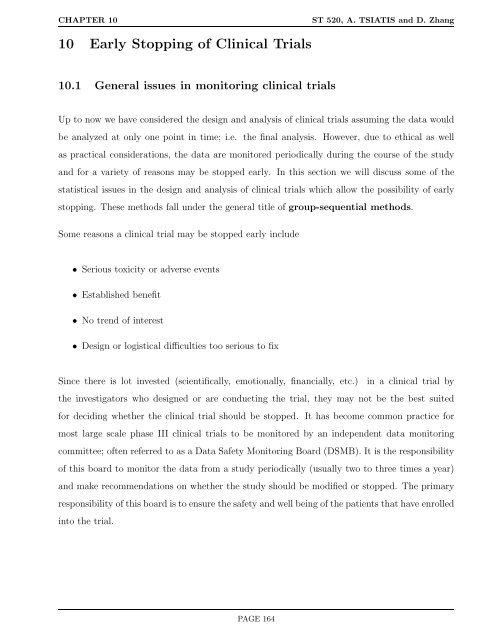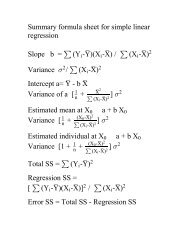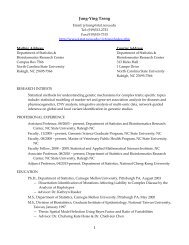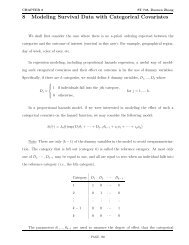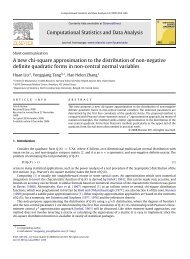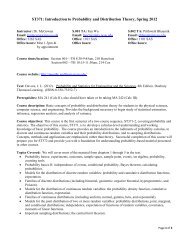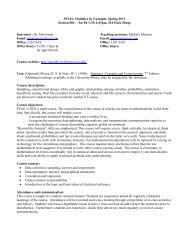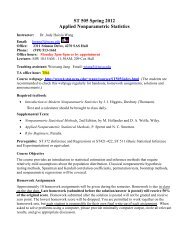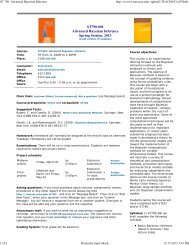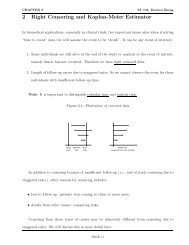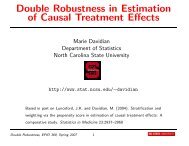- Page 1 and 2:
ST 520 Statistical Principles of Cl
- Page 3 and 4:
TABLE OF CONTENTS ST 520, A. Tsiati
- Page 5 and 6:
CHAPTER 1 ST 520, A. TSIATIS and D.
- Page 7 and 8:
CHAPTER 1 ST 520, A. TSIATIS and D.
- Page 9 and 10:
CHAPTER 1 ST 520, A. TSIATIS and D.
- Page 11 and 12:
CHAPTER 1 ST 520, A. TSIATIS and D.
- Page 13 and 14:
CHAPTER 1 ST 520, A. TSIATIS and D.
- Page 15 and 16:
CHAPTER 1 ST 520, A. TSIATIS and D.
- Page 17 and 18:
CHAPTER 1 ST 520, A. TSIATIS and D.
- Page 19 and 20:
CHAPTER 1 ST 520, A. TSIATIS and D.
- Page 21 and 22:
CHAPTER 1 ST 520, A. TSIATIS and D.
- Page 23 and 24:
CHAPTER 2 ST 520, A. TSIATIS and D.
- Page 25 and 26:
CHAPTER 2 ST 520, A. TSIATIS and D.
- Page 27 and 28:
CHAPTER 2 ST 520, A. TSIATIS and D.
- Page 29 and 30:
CHAPTER 2 ST 520, A. TSIATIS and D.
- Page 31 and 32:
CHAPTER 2 ST 520, A. TSIATIS and D.
- Page 33 and 34:
CHAPTER 2 ST 520, A. TSIATIS and D.
- Page 35 and 36:
CHAPTER 2 ST 520, A. TSIATIS and D.
- Page 37 and 38:
CHAPTER 2 ST 520, A. TSIATIS and D.
- Page 39 and 40:
CHAPTER 3 ST 520, A. TSIATIS and D.
- Page 41 and 42:
CHAPTER 3 ST 520, A. TSIATIS and D.
- Page 43 and 44:
CHAPTER 3 ST 520, A. TSIATIS and D.
- Page 45 and 46:
CHAPTER 3 ST 520, A. TSIATIS and D.
- Page 47 and 48:
CHAPTER 3 ST 520, A. TSIATIS and D.
- Page 49 and 50:
CHAPTER 3 ST 520, A. TSIATIS and D.
- Page 51 and 52:
CHAPTER 3 ST 520, A. TSIATIS and D.
- Page 53 and 54:
CHAPTER 4 ST 520, A. TSIATIS and D.
- Page 55 and 56:
CHAPTER 4 ST 520, A. TSIATIS and D.
- Page 57 and 58:
CHAPTER 4 ST 520, A. TSIATIS and D.
- Page 59 and 60:
CHAPTER 4 ST 520, A. TSIATIS and D.
- Page 61 and 62:
CHAPTER 4 ST 520, A. TSIATIS and D.
- Page 63 and 64:
CHAPTER 4 ST 520, A. TSIATIS and D.
- Page 65 and 66:
CHAPTER 4 ST 520, A. TSIATIS and D.
- Page 67 and 68:
CHAPTER 4 ST 520, A. TSIATIS and D.
- Page 69 and 70:
CHAPTER 4 ST 520, A. TSIATIS and D.
- Page 71 and 72:
CHAPTER 4 ST 520, A. TSIATIS and D.
- Page 73 and 74:
CHAPTER 4 ST 520, A. TSIATIS and D.
- Page 75 and 76:
CHAPTER 4 ST 520, A. TSIATIS and D.
- Page 77 and 78:
CHAPTER 4 ST 520, A. TSIATIS and D.
- Page 79 and 80:
CHAPTER 5 ST 520, A. TSIATIS and D.
- Page 81 and 82:
CHAPTER 5 ST 520, A. TSIATIS and D.
- Page 83 and 84:
CHAPTER 5 ST 520, A. TSIATIS and D.
- Page 85 and 86:
CHAPTER 6 ST 520, A. TSIATIS and D.
- Page 87 and 88:
CHAPTER 6 ST 520, A. TSIATIS and D.
- Page 89 and 90:
CHAPTER 6 ST 520, A. TSIATIS and D.
- Page 91 and 92:
CHAPTER 6 ST 520, A. TSIATIS and D.
- Page 93 and 94:
CHAPTER 6 ST 520, A. TSIATIS and D.
- Page 95 and 96:
CHAPTER 6 ST 520, A. TSIATIS and D.
- Page 97 and 98:
CHAPTER 6 ST 520, A. TSIATIS and D.
- Page 99 and 100:
CHAPTER 6 ST 520, A. TSIATIS and D.
- Page 101 and 102:
CHAPTER 7 ST 520, A. TSIATIS and D.
- Page 103 and 104:
CHAPTER 7 ST 520, A. TSIATIS and D.
- Page 105 and 106:
CHAPTER 7 ST 520, A. TSIATIS and D.
- Page 107 and 108:
CHAPTER 7 ST 520, A. TSIATIS and D.
- Page 109 and 110:
CHAPTER 7 ST 520, A. TSIATIS and D.
- Page 111 and 112:
CHAPTER 7 ST 520, A. TSIATIS and D.
- Page 113 and 114:
CHAPTER 7 ST 520, A. TSIATIS and D.
- Page 115 and 116:
CHAPTER 7 ST 520, A. TSIATIS and D.
- Page 117 and 118: CHAPTER 7 ST 520, A. TSIATIS and D.
- Page 119 and 120: CHAPTER 7 ST 520, A. TSIATIS and D.
- Page 121 and 122: CHAPTER 7 ST 520, A. TSIATIS and D.
- Page 123 and 124: CHAPTER 8 ST 520, A. TSIATIS and D.
- Page 125 and 126: CHAPTER 8 ST 520, A. TSIATIS and D.
- Page 127 and 128: CHAPTER 8 ST 520, A. TSIATIS and D.
- Page 129 and 130: CHAPTER 8 ST 520, A. TSIATIS and D.
- Page 131 and 132: CHAPTER 8 ST 520, A. TSIATIS and D.
- Page 133 and 134: CHAPTER 8 ST 520, A. TSIATIS and D.
- Page 135 and 136: CHAPTER 9 ST 520, A. TSIATIS and D.
- Page 137 and 138: CHAPTER 9 ST 520, A. TSIATIS and D.
- Page 139 and 140: CHAPTER 9 ST 520, A. TSIATIS and D.
- Page 141 and 142: CHAPTER 9 ST 520, A. TSIATIS and D.
- Page 143 and 144: CHAPTER 9 ST 520, A. TSIATIS and D.
- Page 145 and 146: CHAPTER 9 ST 520, A. TSIATIS and D.
- Page 147 and 148: CHAPTER 9 ST 520, A. TSIATIS and D.
- Page 149 and 150: CHAPTER 9 ST 520, A. TSIATIS and D.
- Page 151 and 152: CHAPTER 9 ST 520, A. TSIATIS and D.
- Page 153 and 154: CHAPTER 9 ST 520, A. TSIATIS and D.
- Page 155 and 156: CHAPTER 9 ST 520, A. TSIATIS and D.
- Page 157 and 158: CHAPTER 9 ST 520, A. TSIATIS and D.
- Page 159 and 160: CHAPTER 9 ST 520, A. TSIATIS and D.
- Page 161 and 162: CHAPTER 9 ST 520, A. TSIATIS and D.
- Page 163 and 164: CHAPTER 9 ST 520, A. TSIATIS and D.
- Page 165 and 166: CHAPTER 9 ST 520, A. TSIATIS and D.
- Page 167: CHAPTER 9 ST 520, A. TSIATIS and D.
- Page 171 and 172: CHAPTER 10 ST 520, A. TSIATIS and D
- Page 173 and 174: CHAPTER 10 ST 520, A. TSIATIS and D
- Page 175 and 176: CHAPTER 10 ST 520, A. TSIATIS and D
- Page 177 and 178: CHAPTER 10 ST 520, A. TSIATIS and D
- Page 179 and 180: CHAPTER 10 ST 520, A. TSIATIS and D
- Page 181 and 182: CHAPTER 10 ST 520, A. TSIATIS and D
- Page 183 and 184: CHAPTER 10 ST 520, A. TSIATIS and D
- Page 185 and 186: CHAPTER 10 ST 520, A. TSIATIS and D
- Page 187 and 188: CHAPTER 10 ST 520, A. TSIATIS and D
- Page 189 and 190: CHAPTER 10 ST 520, A. TSIATIS and D
- Page 191 and 192: CHAPTER 10 ST 520, A. TSIATIS and D
- Page 193 and 194: CHAPTER 10 ST 520, A. TSIATIS and D
- Page 195 and 196: CHAPTER 10 ST 520, A. TSIATIS and D
- Page 197 and 198: CHAPTER 10 ST 520, A. TSIATIS and D
- Page 199 and 200: CHAPTER 10 ST 520, A. TSIATIS and D


